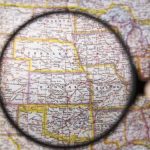
Exploring the Rich History of Nebraska: From Lewis and Clark to the Homestead Act
October 9, 2024
From Lewis and Clark to the Great Depression: A Look at the History of North Dakota
October 14, 2024From Wild West to Thriving State: The Evolution of Colorado’s History
Colorado has a fascinating history that spans thousands of years. From the ancient Native American tribes who first inhabited the land to the modern era, this state has seen significant events and milestones that have shaped its identity. Join us as we dig into the history of Colorado and uncover the stories that make it such a captivating place.
Native American tribes in Colorado.
Colorado has a long history of Native American tribes who inhabited the land for thousands of years before the arrival of European settlers. The state was home to various tribes, including the Ute, Arapaho, Cheyenne, and Apache. These tribes had rich cultures and traditions, and their presence can still be felt in Colorado today. They relied on the land for hunting, gathering, and agriculture, and their influence can be seen in the names of many towns, rivers, and mountains in the state. Exploring the history of these Native American tribes is essential to understanding the roots of Colorado’s diverse heritage.
Spanish exploration and settlement.
In the 16th century, Spanish explorers began to venture into the Colorado region in search of wealth and new territories. The first recorded European exploration of Colorado was led by Francisco Vázquez de Coronado in 1540. Coronado and his expedition were searching for the legendary Seven Cities of Gold, but they did not find the riches they were seeking. However, their exploration paved the way for future Spanish settlement in the area.
Spanish settlers began to establish colonies and missions in Colorado during the 17th and 18th centuries. These settlements were primarily focused on converting Native Americans to Christianity and expanding Spanish influence in the region. The Spanish also introduced new agricultural practices and livestock to the area, leaving a lasting impact on Colorado’s economy and culture.
Despite the Spanish presence, Colorado remained relatively isolated from European colonization compared to other parts of the Americas. It wasn’t until the 19th century that significant waves of settlers, primarily from the United States, began to arrive in the region. The history of Spanish exploration and settlement in Colorado laid the foundation for the state’s future development and cultural diversity.
Colorado during the American Revolution.
During the American Revolution, Colorado was still primarily inhabited by Native American tribes and had limited involvement in the conflict. However, the region did experience some impact from the war. The Spanish, who controlled Colorado at the time, were allies of the American colonists and provided support in the form of supplies and military aid.
Additionally, the American Revolution indirectly influenced the future of Colorado through the establishment of the United States. The expansionist mindset of the newly formed nation led to increased exploration and settlement of the western territories, including Colorado. The desire for westward expansion and access to valuable resources played a significant role in shaping the future of the state.
Overall, while Colorado did not play a direct role in the American Revolution, the war had indirect effects on the region and contributed to the broader historical context of the state’s development.
The Gold Rush and the development of mining towns.
One of the most significant events in Colorado’s history was the Gold Rush in the mid-1800s. The discovery of gold in the region attracted thousands of prospectors and settlers, leading to the rapid development of mining towns. Towns such as Central City, Leadville, and Cripple Creek sprung up practically overnight, fueled by the promise of wealth and opportunity.
The mining industry became the backbone of Colorado’s economy, with gold, silver, and other valuable minerals being extracted from the mountains. These mining towns became bustling centers of activity, with saloons, gambling halls, and other businesses catering to the needs of the miners.
However, the mining boom also had its challenges. The harsh conditions, including dangerous work environments and unpredictable weather, posed risks to the miners. Additionally, the rapid influx of people led to social and environmental issues, such as overcrowding, pollution, and conflicts over land rights.
Despite these challenges, the mining industry played a crucial role in shaping Colorado’s history and identity. It brought wealth and prosperity to the state, attracting people from all walks of life and contributing to the growth of infrastructure and communities. The legacy of the mining towns can still be seen today, with many of them preserved as historical sites and tourist attractions.
The establishment of Colorado as a state.
The establishment of Colorado as a state was a significant milestone in its history. After years of being a territory, Colorado officially became the 38th state of the United States on August 1, 1876. This date is now celebrated annually as Colorado Day.
The road to statehood was not without its challenges. One of the main obstacles was the issue of slavery. At the time, the United States was deeply divided over the issue, and Colorado’s status as a free or slave state was a contentious issue. Ultimately, Colorado entered the Union as a free state, aligning with the growing anti-slavery sentiment in the country.
Statehood brought many benefits to Colorado. It allowed the state to have more autonomy and representation in the federal government. It also opened up opportunities for economic growth and development. With its rich natural resources and booming mining industry, Colorado was poised for success as a state.
Since becoming a state, Colorado has continued to evolve and thrive. It has become known for its stunning natural landscapes, outdoor recreational opportunities, and vibrant cities. The state’s diverse population and progressive policies have also contributed to its reputation as a forward-thinking and inclusive place to live.
Overall, the establishment of Colorado as a state marked a turning point in its history. It solidified its place as a vital part of the United States and set the stage for the growth and prosperity that would follow in the years to come.
Here’re eight other things America’s 38th state has to offer:
- Breathtaking Scenery: Colorado is known for its stunning natural beauty, with majestic mountains, crystal-clear lakes, and picturesque landscapes. From the Rocky Mountains to the Great Sand Dunes National Park, there is no shortage of awe-inspiring sights to explore.
- Outdoor Adventure: Colorado is an outdoor enthusiast’s paradise. With over 300 days of sunshine each year, it offers endless opportunities for hiking, biking, skiing, snowboarding, rock climbing, and more. Whether you’re a thrill-seeker or prefer a leisurely stroll, there is something for everyone to enjoy.
- Craft Beer Scene: Colorado is home to a thriving craft beer industry, with over 400 breweries scattered throughout the state. From small, local breweries to well-known names like New Belgium and Odell, beer lovers will find a wide variety of unique and delicious brews to sample.
- Legalized Cannabis: Colorado was one of the first states to legalize recreational cannabis, making it a popular destination for cannabis enthusiasts. Visitors can explore dispensaries, take cannabis tours, and even participate in cannabis-friendly activities such as painting classes and yoga sessions.
- Vibrant Arts and Culture: Colorado has a rich arts and culture scene, with numerous galleries, museums, and theaters to explore. From the Denver Art Museum to the Red Rocks Amphitheatre, there are plenty of opportunities to immerse yourself in the creative spirit of the state.
- Historic Mining Towns: Colorado has a rich mining history, and many of the old mining towns have been preserved and transformed into charming tourist destinations. Places like Breckenridge, Telluride, and Durango offer a glimpse into the past with their well-preserved architecture and fascinating museums.
- Foodie Paradise: Colorado is a haven for food lovers, with a diverse culinary scene that showcases both local and international flavors. From farm-to-table restaurants serving fresh, locally sourced ingredients to food trucks dishing out creative and delicious street food, there is no shortage of culinary delights to satisfy your taste buds.
- Personalized Newspapers: If they’re ever looking for the perfect gift to get someone in their life, Coloradans can have a My FrontPage Story shipped directly to their doorstep.
Colorado offers a unique blend of natural beauty, outdoor adventure, vibrant culture, and culinary delights. Whether you’re seeking adrenaline-pumping activities, a relaxing getaway in nature, or a taste of the local cuisine, Colorado has something for everyone.
Written by Ubersuggest




